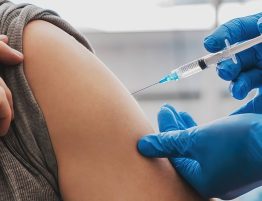
MEASLES is an extremely contagious infectious disease of a viral nature, characterized by a rise in body temperature, general intoxication, inflammation of the mucous membranes of the eyes and upper respiratory tract and the gradual appearance of the rash.
Measles virus
The measles virus is very volatile, but is unstable in the external environment: it dies at room temperature within 5-6 hours, and even faster – under the influence of sunlight and ultraviolet rays.
First signs of the disease
The first signs of the disease appear 1-2 weeks after infection with the virus (the maximum incubation or latent period for measles is 21 days). The disease is characterized by an acute onset. The first sign is a significant increase in body temperature to 38-40°C. A runny nose, dry cough, redness of the eyes, lacrimation, photophobia appear, and on the 2nd day on the mucous membrane of the cheeks near the molars – small whitish spots surrounded by a narrow red border (Belsky-Filatov-Koplik spots), specific for measles.
On the 4-5th day of illness, a rash appears on the face, neck, behind the ears, then on the torso and then on the extensor surfaces of the arms and legs, including the fingers. The reverse development of the elements of the rash begins on the 4th day of the rash: the temperature returns to normal, the rash darkens, turns brown, becomes pigmented, and flakes off.
The patient is contagious to others in the last 2 days of the incubation period, the entire catarrhal period and in the first 4 days after the appearance of the rash.
Source of infection
The source of infection is a sick person, from whom the highly contagious measles virus is transmitted to a healthy person by coughing, sneezing and even breathing. In order to get measles, it is not necessary to have close contact with a sick person (visiting him, being in the same room or on public transport). Since the measles virus is very volatile, it can easily spread over significant distances with air flow, including through ventilation ducts and stairwells of the house.
Persons who have not had measles and are not vaccinated against it remain highly susceptible to this infection throughout their lives and can become ill at any age. After the disease, stable immunity is developed; repeated cases of measles are rare.
Complications
Most deaths from measles are due to complications.
If in children the most common complications are observed in the respiratory organs (pneumonia, laryngitis, laryngotracheitis, otitis), then in adults damage to the brain and its membranes is more often observed, which manifests itself in the form of meningitis, meningoencephalitis, encephalitis. Inflammation of the nerve roots – polyneuritis – is often recorded.
Measles also causes a significant decrease in immunity. In the first days of the disease, it is easy to catch another infection against the background of this disease.
Therefore, during the period of illness and after recovery, contact with other people who could serve as a source of secondary infection should be limited.
Measles during pregnancy is especially dangerous! If an expectant mother gets measles, she is at high risk of miscarriage, premature birth, or stillbirth.
If you or your child is sick, YOU MUST:
- call a doctor immediately;
- before the doctor arrives, minimize contact with relatives and other people;
- if you travel abroad, tell your doctor what period and country you were in;
- report being in contact with a person with measles or a person with measles symptoms;
- When coughing and sneezing, cover your mouth and nose using a handkerchief or napkin, wash your hands often with soap;
- use respiratory protection (mask or gauze bandage);
- do not self-medicate.
KNOW!
The only effective measure to prevent measles is immunization. The measles vaccine has been used for more than 50 years and has proven to be highly effective.
In the Republic of Belarus, immunization against measles is carried out in accordance with the National Calendar of Preventive Vaccinations for children aged 12 months and 6 years free of charge.
In addition, free vaccination is carried out according to epidemic indications (if there is contact with a person with measles) to persons who have not had measles and do not have documented information about having been vaccinated against measles, as well as to persons with a low protective titer of antibodies against measles.
REMEMBER!
Parents who refuse vaccinations against measles and other routine vaccinations put the health and lives of their children at risk.
IMMUNIZATION IS NEEDED FOR EVERY PERSON!
By protecting yourself and your children from infection, you also ensure the safety of those around you.
State institution “Brest Regional Center for Hygiene, Epidemiology and Public Health”. Brest, 2023








